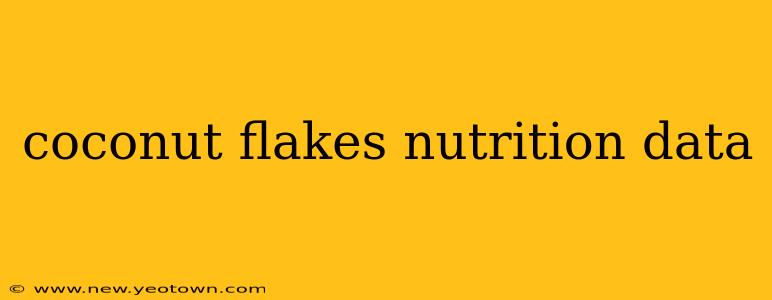Coconut flakes, those delicate, sweet shreds of dried coconut, add a delightful tropical touch to everything from baked goods to yogurt. But beyond their delicious flavor, what's the nutritional story behind these tiny morsels? Let's dive into the details and uncover the surprising nutritional benefits—and potential drawbacks—of coconut flakes.
What are the nutritional benefits of coconut flakes?
Coconut flakes are a surprisingly good source of several essential nutrients. They're packed with fiber, which aids digestion and promotes gut health. This fiber also contributes to feelings of fullness, potentially aiding in weight management. Beyond fiber, coconut flakes offer healthy fats, primarily medium-chain triglycerides (MCTs). These MCTs are quickly metabolized by the body, providing a readily available source of energy. They've also been linked to potential benefits for brain health and metabolism. Additionally, coconut flakes contain small amounts of various vitamins and minerals, including manganese, which plays a role in bone health and metabolism.
Are coconut flakes high in fat?
Yes, coconut flakes are relatively high in fat. However, it's important to remember that this fat is largely composed of saturated fats, specifically MCTs. While saturated fat has often received a bad reputation, MCTs are metabolized differently than other saturated fats and may not have the same negative impact on cholesterol levels. Research on this is ongoing, and moderation is key. The high fat content does contribute to their calorie density, so mindful consumption is advised, especially if you are watching your calorie intake.
Are coconut flakes good for weight loss?
The relationship between coconut flakes and weight loss is complex. While the fiber content can promote satiety and help you feel fuller for longer, the high fat and calorie content can hinder weight loss efforts if consumed in excess. The key here is moderation. Incorporating coconut flakes as part of a balanced diet, rather than relying on them as a primary weight-loss tool, is a more sensible approach. Remember, a calorie deficit is still crucial for weight loss, regardless of the food source.
What are the downsides of eating too many coconut flakes?
While generally healthy in moderation, overconsumption of coconut flakes can lead to several issues. The high saturated fat content, even if composed of MCTs, could potentially impact cholesterol levels in some individuals. Also, the high sugar content from the natural sugars in coconuts can contribute to blood sugar spikes and, in excessive amounts, may negatively impact overall health.
What is the difference between sweetened and unsweetened coconut flakes?
The primary difference lies in the added sugar. Sweetened coconut flakes have added sugar, often cane sugar or other sweeteners, which significantly increases their sugar content and caloric value. Unsweetened coconut flakes are a much healthier option, containing only the natural sugars present in the coconut itself. Opting for unsweetened coconut flakes allows for greater control over your sugar intake and provides a healthier alternative.
How many calories are in coconut flakes?
The calorie count varies depending on the type (sweetened or unsweetened) and brand, but generally, a one-ounce serving of unsweetened coconut flakes contains approximately 126 calories. Sweetened varieties will have significantly more calories due to the added sugar. Always check the nutritional label for the specific calorie and macronutrient information for the brand you choose.
In conclusion, coconut flakes can be a delightful and nutritious addition to your diet when consumed in moderation. Their fiber, MCTs, and unique flavor profile offer several benefits. However, mindful consumption is essential due to their high fat and calorie content. Choosing unsweetened varieties and paying attention to portion sizes will help you reap the rewards of this tropical treat without compromising your health goals.

